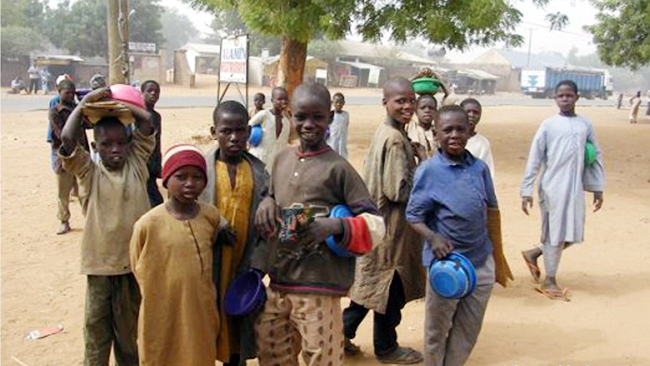In many cities across Nigeria, a familiar and disturbing scene unfolds daily: little boys in tattered clothes clinging to passersby with a plastic bowl in hand. Part of a system known as Almajiri, these malnourished children continue to increase across the country despite numerous interventions.
Contrary to what many may believe, the Almajiri system was not always associated with destitution and street begging. Originally, it was a structured system rooted in the pursuit of Islamic knowledge. During precolonial times, Almajirai, as they are collectively known, were predominantly educated in Islamic schools funded by Emirs, who governed their communities. These institutions provided not just religious education but also the care and supervision these children needed.
However, the advent of colonial rule shifted power away from traditional rulers. Though the Emirs remained in place, they lost much of their control over resources, including funding for Islamic schools. The system still managed to function despite the decline in financial support, but its sustainability was severely compromised as Nigeria underwent significant economic changes.
The oil boom of the 1970s, which propelled Nigeria’s economy forward, simultaneously undermined agriculture, a key livelihood in the north. This contributed to growing poverty, exacerbating the decline of the Almajiri system as fewer resources were available to sustain Islamic education. Additionally, the Structural Adjustment Program (SAP) in the 1980s further strained the region’s financial capacity, and Islamic schools suffered greatly from the dwindling funds.
Gradually, the lack of adequate funding drove Almajiri children out of their schools and onto the streets to fend for themselves. Over time, the word “Almajiri” became synonymous with street begging, as children in dire need of food and money turned to begging as a means of survival. They are now seen not as students pursuing religious knowledge, but as a social problem requiring urgent intervention.
Recognising the growing crisis, the Nigerian government and international organizations have made several attempts to restructure the Almajiri system. The goal is to restore the system to its original model, where children are educated within Islamic schools while living at home, free from the burdens of street begging.
One such initiative was the Universal Basic Education Commission’s (UBEC) Almajiri Education Programme in 2015, which aimed to provide Almajiri children with access to universal education. The programme sought to eliminate street begging by integrating Islamic teachings with secular education, equipping Almajiri children with the skills they needed to thrive in modern Nigerian society.
The intention behind the UBEC’s intervention was to strike a balance between preserving the children’s religious education and equipping them with formal skills that could open doors to economic opportunities. However, despite the potential benefits, the desired transformation has yet to materialise. Children in the Almajiri system remain deprived of formal education or vocational training, leaving them vulnerable to a future of poverty and delinquency.
In 2012, then-President Goodluck Jonathan described the Almajiri system as “dangerous to national development,” urging for reform that would combine traditional Islamic teachings with a modern secular curriculum. His administration established several Islamic learning centres and launched interventions aimed at curbing street begging, but these efforts failed to gain significant traction.
One major obstacle to reform has been the resistance from religious leaders who fear that integrating secular education into Islamic schools could erode the spiritual essence of the Almajiri system. These leaders, who are at the helm of the tsangayas and Islamic schools, hold considerable influence over the system’s operations. Without their support, government initiatives often fall short. In 2010, for example, the construction of 157 Almajiri schools as part of a national framework for integrating the Almajiri system into the Universal Basic Education program faced local resistance for blending secular and religious teachings.
For any restructuring effort to succeed, the government must work closely with religious leaders and community heads who have a stake in maintaining the Almajiri system. They possess the power to either block or support reform and are instrumental in driving change from within the system. Open dialogue and collaboration between the government, religious figures, and educational authorities could be the keys to unlocking progress.
However, even if this approach succeeds, it may not entirely address the complex problem. While the Almajiri population still makes up a significant portion of street children, they are no longer the only ones. Children from economically disadvantaged families across religious and ethnic lines have also taken to the streets, driven by the harsh realities of poverty. The root causes of street begging in Nigeria extend beyond the Almajiri system and point to broader issues of economic instability and social inequality.
Ultimately, any effort to restructure the Almajiri system must go hand in hand with broader economic reforms that alleviate the poverty driving children to the streets. Addressing the underlying economic conditions faced by families across Nigeria will be essential in reducing the number of children living in poverty and at risk of turning to street begging as a means of survival.
While the Almajiri system can be restructured to offer these children a better chance at a future, addressing the country’s wider economic challenges will ensure that no child, regardless of their background, is forced onto the streets to seek what their families cannot provide.
The Almajiri system in Nigeria, originally designed as a structured educational system for Islamic knowledge, has deteriorated into a state synonymous with child begging and destitution. Historically funded by Emirs and integrated into precolonial society, the system suffered under colonial rule, lost crucial financial support, and further declined due to economic crises such as the oil boom and the Structural Adjustment Program. These economic shifts forced Almajiri children onto the streets, transforming them from students into beggars.
Efforts to reform the system, like the Universal Basic Education Commission’s Almajiri Education Programme, aimed to integrate Islamic and secular education. Despite good intentions, these initiatives faced resistance from religious leaders concerned about the loss of spiritual integrity and failed to achieve substantial progress. Successful reform necessitates collaboration between the government and religious leaders to balance religious education with essential modern skills.
Furthermore, the crux of the problem extends beyond the Almajiri system, reflecting broader economic and social instability in Nigeria. Comprehensive economic reforms are essential to eliminating poverty and preventing children from resorting to street begging, ensuring that all children have access to education and opportunities regardless of their background.






